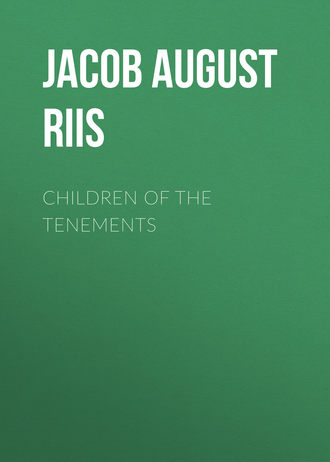 полная версия
полная версияChildren of the Tenements
The Captain went out, tugging viciously at his gloves. He was in very bad humor. The policeman at the Mulberry Street door got hardly a nod for his cheery "Merry Christmas" as he passed.
"Wonder what's crossed him," he said, looking down the street after him.
The green lamps were lighted and shone upon the hurrying six o'clock crowds from the Broadway shops. In the great business buildings the iron shutters were pulled down and the lights put out, and in a little while the reporters' boys that carried slips from Headquarters to the newspaper offices across the street were the only tenants of the block. A stray policeman stopped now and then on the corner and tapped the lamp-post reflectively with his club as he looked down the deserted street and wondered, as his glance rested upon the Chief's darkened windows, how it felt to have six thousand dollars a year and every night off. In the Detective Office the Sergeant who had come in at roll-call stretched himself behind the desk and thought of home. The lights of a Christmas tree in the abutting Mott Street tenement shone through his window, and the laughter of children mingled with the tap of the toy drum. He pulled down the sash in order to hear better. As he did so, a strong draught swept his desk. The outer door slammed. Two detectives came in bringing a prisoner between them. A woman accompanied them.
The Sergeant pulled the blotter toward him mechanically and dipped his pen.
"What's the charge?" he asked.
"Picking pockets in Fourteenth Street. This lady is the complainant, Mrs. –"
The name was that of a well-known police magistrate. The Sergeant looked up and bowed. His glance took in the prisoner, and a look of recognition came into his face.
"What, Bill! So soon?" he said.
The prisoner was sullenly silent. He answered the questions put to him briefly, and was searched. The stolen pocket-book, a small paper package, and a crumpled letter were laid upon the desk. The Sergeant saw only the pocket-book.
"Looks bad," he said with wrinkled brow.
"We caught him at it," explained the officer. "Guess Bill has lost heart. He didn't seem to care. Didn't even try to get away."
The prisoner was taken to a cell. Silence fell once more upon the office. The Sergeant made a few red lines in the blotter and resumed his reveries. He was not in a mood for work. He hitched his chair nearer the window and looked across the yard. But the lights there were put out, the children's laughter had died away. Out of sorts at he hardly knew what, he leaned back in his chair, with his hands under the back of his head. Here it was Christmas Eve, and he at the desk instead of being out with the old woman buying things for the children. He thought with a sudden pang of conscience of the sled he had promised to get for Johnnie and had forgotten. That was hard luck. And what would Katie say when—
He had got that far when his eye, roaming idly over the desk, rested upon the little package taken from the thief's pocket. Something about it seemed to move him with sudden interest. He sat up and reached for it. He felt it carefully all over. Then he undid the package slowly and drew forth a woolly sheep. It had a blue ribbon about its neck, with a tiny bell hung on it.
The Sergeant set the sheep upon the desk and looked at it fixedly for better than a minute. Having apparently studied out its mechanism, he pulled its head and it baa-ed. He pulled it once more, and nodded. Then he took up the crumpled letter and opened it.
This was what he read, scrawled in a child's uncertain hand:—
"Deer Sante Claas—Pease wont yer bring me a sjeep wat bas. Aggie had won wonst. An Kate wants a dollie offul. In the reere 718 19th Street by the gas house. Your friend Will."
The Sergeant read it over twice very carefully and glanced over the page at the sheep, as if taking stock and wondering why Kate's dollie was not there. Then he took the sheep and the letter and went over to the Captain's door. A gruff "Come in!" answered his knock. The Captain was pulling off his overcoat. He had just come in from his dinner.
"Captain," said the Sergeant, "we found this in the pocket of Black Bill who is locked up for picking Mrs. –'s pocket an hour ago. It is a clear case. He didn't even try to give them the slip," and he set the sheep upon the table and laid the letter beside it.
"Black Bill?" said the Captain, with something of a start; "the dickens, you say!" And he took up the letter and read it. He was not a very good penman, was little Will. The Captain had even a harder time of it than the Sergeant had had making out his message.
Three times he went over it, spelling out the words, and each time comparing it with the woolly exhibit that was part of the evidence, before he seemed to understand. Then it was in a voice that would have frightened little Will very much could he have heard it, and with a black look under his bushy eyebrows, that he bade the Sergeant "Fetch Bill up here!" One might almost have expected the little white lamb to have taken to its heels with fright at having raised such a storm, could it have run at all. But it showed no signs of fear. On the contrary it baa-ed quite lustily when the Sergeant should have been safely out of earshot. The hand of the Captain had accidentally rested upon the woolly head in putting down the letter. But the Sergeant was not out of earshot. He heard it and grinned.
An iron door in the basement clanged and there were steps in the passageway. The doorman brought in Bill. He stood by the door, sullenly submissive. The Captain raised his head. It was in the shade.
"So you are back, are you?" he said.
The thief nodded.
The Captain bent his brows upon him and said with sudden fierceness, "You couldn't keep honest a month, could you?"
"They wouldn't let me. Who wants a thief in his pay? And the children were starving."
It was said patiently enough, but it made the Captain wince all the same. They were his own words. But he did not give in so easily.
"Starving?" he repeated harshly. "And that's why you got this, I suppose," and he pushed the sheep from under the newspaper that had fallen upon it by accident and covered it up.
The thief looked at it and flushed to the temples. He tried to speak but could not. His face worked, and he seemed to be strangling. In the middle of his fight to master himself he saw the child's crumpled message on the desk. Taking a quick step across the room he snatched it up, wildly, fiercely.
"Captain," he gasped, and broke down utterly. The hardened thief wept like a woman.
The Captain rang his bell. He stood with his back to the prisoner when the doorman came in. "Take him down," he commanded. And the iron door clanged once more behind the prisoner.
Ten minutes later the reporters were discussing across the way the nature of "the case" which the night promised to develop. They had piped off the Captain and one of his trusted men leaving the building together, bound east. Could they have followed them all the way, they would have seen them get off the car at Nineteenth Street, and go toward the gas house, carefully scanning the numbers of the houses as they went. They found one at last before which they halted. The Captain searched in his pocket and drew forth the baby's letter to Santa Claus, and they examined the number under the gas lamp. Yes, that was right. The door was open, and they went right through to the rear.
Up in the third story three little noses were flattened against the window pane, and three childish mouths were breathing peep-holes through which to keep a lookout for the expected Santa Claus. It was cold, for there was no fire in the room, but in their fever of excitement the children didn't mind that. They were bestowing all their attention upon keeping the peep-holes open.
"Do you think he will come?" asked the oldest boy—there were two boys and a girl—of Kate.
"Yes, he will. I know he will come. Papa said so," said the child in a tone of conviction.
"I'se so hungry, and I want my sheep," said Baby Will.
"Wait and I'll tell you of the wolf," said his sister, and she took him on her lap. She had barely started when there were steps on the stairs and a tap on the door. Before the half-frightened children could answer it was pushed open. Two men stood on the threshold. One wore a big fur overcoat. The baby looked at him in wide-eyed wonder.
"Is you Santa Claus?" he asked.
"Yes, my little man, and are you Baby Will?" said a voice that was singularly different from the harsh one Baby Will's father had heard so recently in the Captain's office, and yet very like it.
"See. This is for you, I guess," and out of the big roomy pocket came the woolly sheep and baa-ed right off as if it were his own pasture in which he was at home. And well might any sheep be content nestling at a baby heart so brimful of happiness as little Will's was then, child of a thief though he was.
"Papa spoke for it, and he spoke for Kate, too, and I guess for everybody," said the bogus Santa Claus, "and it is all right. My sled will be here in a minute. Now we will just get to work and make ready for him. All help!"
The Sergeant behind the desk in the Detective Office might have had a fit had he been able to witness the goings-on in that rear tenement in the next hour; and then again he might not. There is no telling about those Sergeants. The way that poor flat laid itself out of a sudden was fairly staggering. It was not only that a fire was made and that the pantry filled up in the most extraordinary manner; but a real Christmas tree sprang up, out of the floor, as it were, and was found to be all besprinkled with gold and stars and cornucopias with sugarplums. From the top of it, which was not higher than Santa Claus could easily reach, because the ceiling was low, a marvellous doll, with real hair and with eyes that could open and shut, looked down with arms wide open to take Kate to its soft wax heart. Under the branches of the tree browsed every animal that went into and came out of Noah's Ark, and there were glorious games of Messenger Boy and Three Bad Bears, and honey-cakes and candy apples, and a little yellow-bird in a cage, and what not? It was glorious. And when the tea-kettle began to sing, skilfully manipulated by Santa Claus's assistant, who nominally was known in Mulberry Street as Detective Sergeant Murphy, it was just too lovely for anything. The baby's eyes grew wider and wider, and Kate's were shining with happiness, when in the midst of it all she suddenly stopped and said:—
"But where is papa? Why don't he come?"
Santa Claus gave a little start at the sudden question, but pulled himself together right away.
"Why, yes," he said, "he must have got lost. Now you are all right we will just go and see if we can find him. Mrs. McCarthy here next door will help you keep the kettle boiling and the lights burning till we come back. Just let me hear that sheep baa once more. That's right! I bet we'll find papa." And out they went.
An hour later, while Mr. –, the Magistrate, and his good wife were viewing with mock dismay the array of little stockings at their hearth in their fine up-town house, and talking of the adventure of Mrs. – with the pickpocket, there came a ring at the door-bell and the Captain of the detectives was ushered in. What he told them I do not know, but this I do know, that when he went away the honorable Magistrate went with him, and his wife waved good-by to them from the stoop with wet eyes as they drove away in a carriage hastily ordered up from a livery stable. While they drove down town, the Magistrate's wife went up to the nursery and hugged her sleeping little ones, one after the other, and tear-drops fell upon their warm cheeks that had wiped out the guilt of more than one sinner before, and the children smiled in their sleep. They say among the simple-minded folk of far-away Denmark that then they see angels in their dreams.
The carriage stopped in Mulberry Street, in front of Police Headquarters, and there was great scurrying among the reporters, for now they were sure of their "case." But no "prominent citizen" came out, made free by the Magistrate, who opened court in the Captain's office. Only a rough-looking man with a flushed face, whom no one knew, and who stopped on the corner and looked back as one in a dream and then went east, the way the Captain and his man had gone on their expedition personating no less exalted a personage than Santa Claus himself.
That night there was Christmas, indeed, in the rear tenement "near the gas house," for papa had come home just in time to share in its cheer. And there was no one who did it with a better will, for the Christmas evening that began so badly was the luckiest night in his life. He had the promise of a job on the morrow in his pocket, along with something to keep the wolf from the door in the holidays. His hard days were over, and he was at last to have his chance to live an honest life. And it was the baby's letter to Santa Claus and the baa sheep that did it all, with the able assistance of the Captain and the Sergeant. Don't let us forget the Sergeant.
LOST CHILDREN
I am not thinking now of theological dogmas or moral distinctions. I am considering the matter from the plain every-day standpoint of the police office. It is not my fault that the one thing that is lost more persistently than any other in a large city is the very thing you would imagine to be safest of all in the keeping of its owner. Nor do I pretend to explain it. It is simply one of the contradictions of metropolitan life. In twenty years' acquaintance with the police office, I have seen money, diamonds, coffins, horses, and tubs of butter brought there and pass into the keeping of the property clerk as lost or strayed. I remember a whole front stoop, brownstone, with steps and iron railing all complete, being put up at auction, unclaimed. But these were mere representatives of a class which as a whole kept its place and the peace. The children did neither. One might have been tempted to apply the old inquiry about the pins to them but for another contradictory circumstance: rather more of them are found than lost.
The Society for the Prevention of Cruelty to Children keeps the account of the surplus. It has now on its books half a score Jane Does and twice as many Richard Roes, of whom nothing more will ever be known than that they were found, which is on the whole, perhaps, best—for them certainly. The others, the lost, drift from the tenements and back, a host of thousands year by year. The two I am thinking of were of these, typical of the maelstrom.
Yette Lubinsky was three years old when she was lost from her Essex Street home, in that neighborhood where once the police commissioners thought seriously of having the children tagged with name and street number, to save trotting them back and forth between police station and Headquarters. She had gone from the tenement to the corner where her father kept a stand, to beg a penny, and nothing more was known of her. Weeks after, a neighbor identified one of her little frocks as the match of one worn by a child she had seen dragged off by a rough-looking man. But though Max Lubinsky, the pedler, and Yette's mother camped on the steps of Police Headquarters early and late, anxiously questioning every one who went in and out about their lost child, no other word was heard of her. By and by it came to be an old story, and the two were looked upon as among the fixtures of the place. Mulberry Street has other such.
They were poor and friendless in a strange land, the very language of which was jargon to them, as theirs was to us, timid in the crush, and they were shouldered out. It was not inhumanity; at least, it was not meant to be. It was the way of the city, with every one for himself; and they accepted it, uncomplaining. So they kept their vigil on the stone steps, in storm and fair weather, every night taking turns to watch all who passed. When it was a policeman with a little child, as it was many times between sunset and sunrise, the one on the watch would start up the minute they turned the corner, and run to meet them, eagerly scanning the little face, only to return, disappointed but not cast down, to the step upon which the other slept, head upon knees, waiting the summons to wake and watch.
Their mute sorrow appealed to me, then doing night duty in the newspaper office across the way, and I tried to help them in their search for the lost Yette. They accepted my help gratefully, trustfully, but without loud demonstration. Together we searched the police records, the hospitals, the morgue, and the long register of the river's dead. She was not there. Having made sure of this, we turned to the children's asylums. We had a description of Yette sent to each and every one, with the minutest particulars concerning her and her disappearance, but no word came back in response. A year passed, and we were compelled at last to give over the search. It seemed as if every means of finding out what had become of the child had been exhausted, and all alike had failed.
During the long search, I had occasion to go more than once to the Lubinskys' home. They lived up three flights, in one of the big barracks that give to the lower end of Essex Street the appearance of a deep black cañon with cliff-dwellers living in tiers all the way up, their watch-fires showing like so many dull red eyes through the night. The hall was pitch-dark, and the whole building redolent of the slum; but in the stuffy little room where the pedler lived there was, in spite of it all, an atmosphere of home that set it sharply apart from the rest. One of these visits I will always remember. I had stumbled in, unthinking, upon their Sabbath-eve meal. The candles were lighted, and the children gathered about the table; at its head, the father, every trace of the timid, shrinking pedler of Mulberry Street laid aside with the week's toil, was invoking the Sabbath blessing upon his house and all it harbored. I saw him turn, with a quiver of the lip, to a vacant seat between him and the mother, and it was then that I noticed the baby's high chair, empty, but kept ever waiting for the little wanderer. I understood; and in the strength of domestic affection that burned with unquenched faith in the dark tenement after the many months of weary failure I read the history of this strange people that in every land and in every day has conquered even the slum with the hope of home.
It was not to be put to shame here, either. Yette returned, after all, and the way of it came near being stranger than all the rest. Two long years had passed, and the memory of her and hers had long since faded out of Mulberry Street, when, in the overhauling of one of the children's homes we thought we had canvassed thoroughly, the child turned up, as unaccountably as she had been lost. All that I ever learned about it was that she had been brought there, picked up by some one in the street, probably, and, after more or less inquiry that had failed to connect with the search at our end of the line, had been included in their flock on some formal commitment, and had stayed there. Not knowing her name,—she could not tell it herself, to be understood,—they had given her one of their own choosing; and thus disguised, she might have stayed there forever but for the fortunate chance that cast her up to the surface once more, and gave the clew to her identity at last. Even then her father had nearly as much trouble in proving his title to his child as he had had in looking for her, but in the end he made it good. The frock she had worn when she was lost proved the missing link. The mate of it was still carefully laid away in the tenement. So Yette returned to fill the empty chair at the Sabbath board, and the pedler's faith was justified.
My other chip from the maelstrom was a lad half grown. He dropped into my office as if out of the clouds, one long and busy day, when, tired and out of sorts, I sat wishing my papers and the world in general in Halifax. I had not heard the knock, and when I looked up, there stood my boy, a stout, square-shouldered lad, with heavy cowhide boots and dull, honest eyes—eyes that looked into mine as if with a question they were about to put, and then gave it up, gazing straight ahead, stolid, impassive. It struck me that I had seen that face before, and I found out immediately where. The officer of the Children's Aid Society who had brought him explained that Frands—that was his name—had been in the society's care five months and over. They had found him drifting in the streets, and, knowing whither that drift set, had taken him in charge and sent him to one of their lodging-houses, where he had been since, doing chores and plodding about in his dull way. That was where I had met him. Now they had decided that he should go to Florida, if he would, but first they would like to find out something about him. They had never been able to, beyond the fact that he was from Denmark. He had put his finger on the map in the reading-room, one day, and shown them where he came from: that was the extent of their information on that point. So they had sent him to me to talk to him in his own tongue and see what I could make of him.
I addressed him in the politest Danish I was master of, and for an instant I saw the listening, questioning look return; but it vanished almost at once, and he answered in monosyllables, if at all. Much of what I said passed him entirely by. He did not seem to understand. By slow stages I got out of him that his father was a farm-laborer; that he had come over to look for his cousin, who worked in Passaic, New Jersey, and had found him,—Heaven knows how!—but had lost him again. Then he had drifted to New York, where the society's officers had come upon him. He nodded when told that he was to be sent far away to the country, much as if I had spoken of some one he had never heard of. We had arrived at this point when I asked him the name of his native town.
The word he spoke came upon me with all the force of a sudden blow. I had played in the old village as a boy; all my childhood was bound up in its memories. For many years now I had not heard its name—not since boyhood days—spoken as he spoke it. Perhaps it was because I was tired: the office faded away, desk, Headquarters across the street, boy, officer, business, and all. In their place were the brown heath I loved, the distant hills, the winding wagon track, the peat stacks, and the solitary sheep browsing on the barrows. Forgotten the thirty years, the seas that rolled between, the teeming city! I was at home again, a child. And there he stood, the boy, with it all in his dull, absent look. I read it now as plain as the day.
"Hua er et no? Ka do ett fostó hua a sejer?"
It plumped out of me in the broad Jutland dialect I had neither heard nor spoken in half a lifetime, and so astonished me that I nearly fell off my chair. Sheep, peat-stacks, cairn, and hills all vanished together, and in place of the sweet heather there was the table with the tiresome papers. I reached out yearningly after the heath; I had not seen it for such a long time,—how long it did seem!—and—but in the same breath it was all there again in the smile that lighted up Frands's broad face like a glint of sunlight from a leaden sky.
"Joesses, jou," he laughed, "no ka a da saa grou godt."1
It was the first honest Danish word he had heard since he came to this bewildering land. I read it in his face, no longer heavy or dull; saw it in the way he followed my speech—spelling the words, as it were, with his own lips, to lose no syllable; caught it in his glad smile as he went on telling me about his journey, his home, and his homesickness for the heath, with a breathless kind of haste, as if now that at last he had a chance, he were afraid it was all a dream, and that he would presently wake up and find it gone. Then the officer pulled my sleeve.
He had coughed once or twice, but neither of us had heard him. Now he held out a paper he had brought, with an apologetic gesture. It was an agreement Frands was to sign, if he was going to Florida. I glanced at it. Florida? Yes, to be sure; oh, yes, Florida. I spoke to the officer, and it was in the Jutland dialect. I tried again, with no better luck. I saw him looking at me queerly, as if he thought it was not quite right with me, either, and then I recovered myself, and got back to the office and to America; but it was an effort. One does not skip across thirty years and two oceans, at my age, so easily as that.









